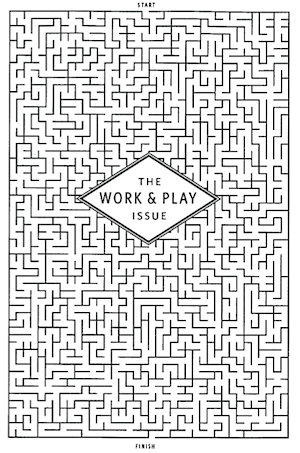

A pair of (somewhat) related articles came across my desk yesterday that seem especially relevant with the new ‘Work and Play’ issue of The Mockingbird shipping today. The first is the latest dispatch on that cultural flashpoint known as Busyness. In a pithy blogpost for The Huffington Post, Scott Dannemiller contends that “Busyness Is a Sickness”. Particularly interesting to me was the distinction he makes between ‘busyness’ and ‘stress’, one being elective (in theory) and the other not, ht SM:
Dr. Susan Koven practices internal medicine at Massachusetts General Hospital. In a 2013 Boston Globe column, she wrote:
In the past few years, I’ve observed an epidemic of sorts: patient after patient suffering from the same condition. The symptoms of this condition include fatigue, irritability, insomnia, anxiety, headaches, heartburn, bowel disturbances, back pain, and weight gain. There are no blood tests or X-rays diagnostic of this condition, and yet it’s easy to recognize. The condition is excessive busyness.
We’ve heard for years that excessive stress causes health problems. But notice that Dr. Koven didn’t say stress. She said busyness. And it’s an epidemic.
Dr. Michael Marmot, a British epidemiologist, has studied stress and its effects, and found the root causes to be two types of busyness. Though he doesn’t give them official names, he describes the most damaging as busyness without control, which primarily affects the poor. Their economic reality simply does not allow for downtime. They have to work two to three jobs to keep the family afloat. When you add kids to the mix, it becomes overwhelming, and the stress results in legitimate health problems.
The second type of busyness also results in health problems, but it is a sickness we bring on ourselves. Like voluntarily licking the door handle of a preschool bathroom or having a sweaty picnic in the Ball Pit at Chuck E. Cheese’s. It’s busyness we control.

It’s telling that the images he chooses–door handle licking and ball pit picnics–sound more like the behavior of an addict than someone “controlling” anything. Which is not to diminish the material poverty that causes people such unending stress, only to note that being “poor in spirit” is a real thing too, and no respecter of privilege. So, to paraphrase the epidemiologist above, those most ensnared by busyness may be they whose psycho-spiritual reality does not allow for downtime either. If so, then we’re dangerously close to what St. Paul called “slavery to sin”–an inherited rather than circumstantial condition, but one no less oppressive or worthy of compassion. Dannemiller flirts with the implications when he admits how it functions in his own life:
Most of the time, I manufacture urgency in hopes that it will create urgency in others. Instead, it only creates anxiety, resentment and spite. Which is absolutely counter-productive. And even in the cases where the urgency is real, it’s often due to a packed schedule I created.
In America, we are defined by what we do. Our careers. What we produce. It’s the first question asked at parties, and often the first tidbit of information we share with strangers. The implication is that if I am not busy doing something, I am somehow less than. Not worthy. Or at least worth less than those who are producing something.
This is familiar territory, and even if Dannemiller doesn’t necessarily do it justice (surely I’m not the only one who found it disappointing that the only solution on offer has to do with calling life “full” rather than “busy”), it’s still worth revisiting. For a more penetrating analysis, I’d look to Tim Kreider or Brene Brown or Tullian Tchividjian, all of whom view busyness as an opiate as much as a sickness, a culturally baptized mode of distraction from deeper questions and feelings (emptiness, death, shame, etc) that tends to perpetuate the very things it is trying to assuage–hint, hint, nudge, nudge. “Exhaustion is not a status symbol” is how Brene puts it, and all I can say amen.
Bottomline is, we are hearing more and more about the busyness epidemic, and I’m glad of that. If only the root issue could be fixed by analyzing or understanding it deeply enough! Alas, the most effective means of relief right now seems to have little if anything to do with information or even self-knowledge. Instead it has to do with finding the space/time to stop and just be. Something fundamentally passive. I’m talking about ‘mindfulness’. The term itself is a little hokey, yes, and so is a lot of the New Age hoopla that surrounds it. But if you can look past the self-help language–and it’s not always easy–you can see why it has become such a buzzword. I say that as someone whose has found certain ‘mindful’ practices helpful, and even deepening of theological convictions.
 At its best, mindfulness represents a way to experience reprieve and rest from the scorekeeping that causes us so much suffering and anxiety. It’s essentially a therapeutic technique that seeks to filter out many of the little-l laws that haunt our inner lives, a method of internalizing the truth that we are not defined by the narratives (and judgments) which attach themselves to our thoughts, that our value is found in ‘being’ not ‘doing’. Which is not exactly a stretch for those who think in terms of the faith vs. works dichtomy.
At its best, mindfulness represents a way to experience reprieve and rest from the scorekeeping that causes us so much suffering and anxiety. It’s essentially a therapeutic technique that seeks to filter out many of the little-l laws that haunt our inner lives, a method of internalizing the truth that we are not defined by the narratives (and judgments) which attach themselves to our thoughts, that our value is found in ‘being’ not ‘doing’. Which is not exactly a stretch for those who think in terms of the faith vs. works dichtomy.
Christians tend to get uncomfortable with mindfulness to the extent that it casts the self as mediator of forgiveness rather than Christ, and while it’s a legitimate gripe, nothing about mindfulness demands that you check your soteriology at the door. At least not according to the practitioners that I’ve met and interacted with. Absolution, if it is real and effectual, has only one source after all. But I digress.
What does this have to do with the busyness epidemic? That’s where the second article comes in. The Atlantic published an interview with David Gelles about his new book, Mindful Work, which covers the rising trend among corporations to utilize mindfulness in their training of employees. Turns out mindfulness–like sleep, play, creativity, and failure before it–has become the latest colony of the cult of productivity, co-opted for the efficiency and focus it sometimes engenders. How else to explain a sentence like “Aetna estimates that since instituting its mindfulness program, it has saved about $2,000 per employee in health-care costs, and gained about $3,000 per employee in productivity. Mindful employees, the thinking goes, are healthier and more focused.” Oy vey. A couple of the exchanges are worth reproducing:
Joe Pinsker: So why then do you think that mindfulness is taking root in the corporate world now? My first-blush theory is that businesses are more likely embrace things that they can quantify, and only really recently has the research into mindfulness been able to put really hard numbers on its benefits. Do you think that’s a good theory, or no?
Gelles: I think that’s a big part of it, absolutely. I think there are three main reasons why we’re seeing mindfulness in the workplace today more than ever before. The first is exactly what you said. Over the last 30 years, there’s been this tremendous volume of research. Academic research, scientific research that’s been really quantifying the effects of mindfulness. And we can now see it actually changes the structures of our brain in ways that we think are largely positive. It actually improves our immune system in ways that we can verifiably measure. It actually seems to reduce the stress we experience and the stress that our bodies seem to be reporting, through measures like heart-rate variability and cortisol levels. So the data is there. We know that it’s making changes and that these changes are largely beneficial.
And now, we’re just starting to see the next step of this. We’re starting to see companies do some work analyzing what happens when they roll out mindfulness at scale. And so at Aetna, the company I profiled in the Times earlier this month, health-care costs actually went down at the company in the first full year after they rolled it out. All of a sudden, there’s this tantalizing promise that maybe it can even affect the bottom line. So that’s one reason…
I think mindfulness is being accepted in the workplace today because we need it more than ever, it seems. We are so stressed. We are so bombarded with constant information overload. We are so addicted to our technology that the promise of a technique that allows us to come back to the present moment and stop obsessing about whatever it we just read in our Twitter stream or what we’re about to post on our Facebook page has a unique and enduring allure that is totally understandable. I mean, after a totally frenetic workday here at the Times, the opportunity to quiet down is totally lovely…
Pinsker: Is there anything contradictory about harnessing the power of mindfulness, which is in part meant to diminish the importance of worldly pursuits, to improve the bottom line?
Gelles: We live in a capitalist economy, and mindfulness can’t change that. I think what it can do, hopefully, is give individuals, influencers of organizations, and maybe even companies themselves the perspective that’s needed to make decisions and changes, even, that are beneficial, not just to the bottom line but to our emotional, physical, and social well-being…
So, I don’t think the two things are incompatible because I think it’s about managing expectations. Nowhere have I heard, and I hope I didn’t suggest, that mindfulness is somehow going to lead to the next utopia. It’s not going to fix all our problems. But my hope is that it can help on the edges.
Clearly the benefits are not up for debate. Whatever name you wish to use, there is something deeply therapeutic being tapped into, and it has to do with stillness, peace, rest, compassion, etc. We need more of this, not less–at the office, at home, yes, even/especially in a church that has by and large swallowed the culture’s line about performance and growth. Techniques will not save us, but they may make life a little more livable.
But there is a fundamental irony at work here as well. Mindfulness, with its emphasis on the present rather than the future, being not doing, is the opposite of productivity. In fact, some would say that the only way to ensure that it won’t help you is to demand that it do so, i.e. that it produce such-and-such a result. The fact that we have turned, in such large numbers, to something so counter-intuitive and ostensibly non-measurable/-legalistic should serve as an indication of just how crazy-making all the crazy-busyness has become.
And yet, such is our pathology that we cannot let ‘being’ be; the expectations, to use Gelles’ language, will not be managed. The moment passivity looks like it’s ‘working’ is the moment we harness it for our self-justification, the moment we twist it into yet another an instrument of credit. This doesn’t mean that a mindful brain isn’t a whole lot healthier/happier than a distractedly busy one. It just means that the real disease isn’t busyness but sin.
I’ll close by referencing some thinking on this subject that I tried to do in an essay that appears in the new issue of The Mockingbird journal, which explores this topic at considerably greater length:
“Let us not scapegoat productivity (or capitalism). It is not some foreign force that preys upon unsuspecting men and women. Our culture may foster beneficial conditions, but the cult of productivity is so effective, and ironically enough, efficient, because of the foothold it finds inside every human heart, and always has. We love quantification because we love control. What is the allure of measurement if not the promise of personal dominion? That if I can study my chart I can manipulate its direction? This is the false promise of the law, which demands perfect adherence but cannot inspire it, which may in fact produce worse results. As with most attempts to control reality, the treadmill of “always-on” productivity ends up controlling us. The trajectory starts heading down, down, down, and we all know where it ends—not in the playground, but in the graveyard.
Fortunately, there are worse places to be than in a graveyard, surrounded by symbols of heavenly rest. Given the inroads made by the cult of productivity, we may find that the good news emblazoned on so many tombstones shines that much brighter—in particular the epitaphs of those who have been justified not by works but by faith in the one who suffered the full weight of human shortcoming, moral and otherwise.”
https://www.youtube.com/watch?v=e9J4yg9rVOg

COMMENTS
5 responses to “Mindful of Our Busyness”
Leave a Reply













Dr. Koven’s diagnosis may be bogus and a copout. In 2006, my wife received a similar diagnosis from some of those same symptoms. A week later, she had a heart attack from two blocked arteries. When docs use “busyness” as their diagnosis it may be time to find another doctor.